撰文:David,深潮 TechFlow
当你真正支持一件事,最直接的方式就是给它打钱。
11 月 26 日,Vitalik Buterin 向两个隐私通讯应用 Session 和 SimpleX 各捐赠了 128 ETH,总价值约 76 万美元。
他在推文中写道:加密通讯对保护数字隐私至关重要,下一步的关键是实现无许可账户创建和元数据隐私。
76 万美元不是小数目,但更让人好奇的是这两个收钱的应用。
Session 和 SimpleX 在加密圈之外几乎没有知名度,Vitalik 为什么要把钱投给它们,而不是更成熟的隐私通讯工具?
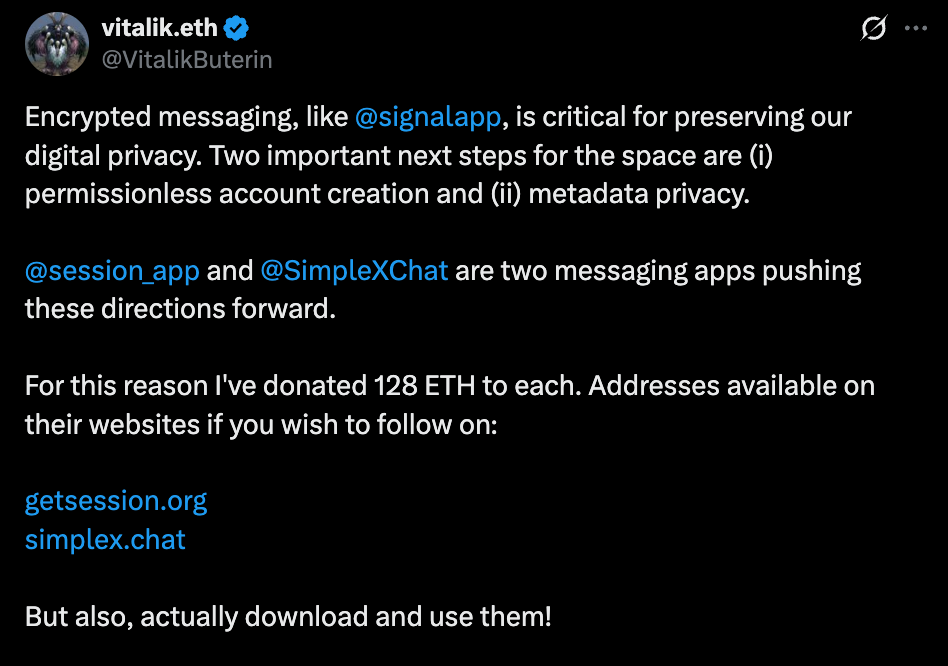
捐赠金额本身也有点意思。
128 对人类来说不是个方便的数字,但在二进制中是 2 的 7 次方。有社区成员解读这是 Vitalik 的某种表态,这是一笔结构性的隐私投资,不是随手打赏。
就在捐赠前一天,欧盟理事会刚就「Chat Control」提案达成协议。这项提案要求通讯平台扫描用户的私人消息,被隐私倡导者视为对端到端加密的直接威胁。
Vitalik 选在这个时候公开捐赠,态度已经很明确:他认为现有的隐私通讯方案还不够,需要支持更激进的替代品。
市场似乎也读懂了这个信号。Session 的代币 SESH 在消息公布后从不到 0.04 美元最高拉升到 0.40 美元左右,一周涨幅超过450%。
我们可以来快速看看这两个应用到底是什么,凭什么值得 Vitalik 押注?

Session,用 DePIN 做隐私通讯
Session 是一款去中心化的端到端加密通讯应用,2020 年正式上线,目前有近 100 万用户。
它最初由澳大利亚的 Oxen Privacy Tech Foundation 开发,2024 年因澳大利亚隐私立法收紧,团队将运营主体迁至瑞士,成立了 Session Technology Foundation。
这款应用的核心卖点是「不需要手机号」。
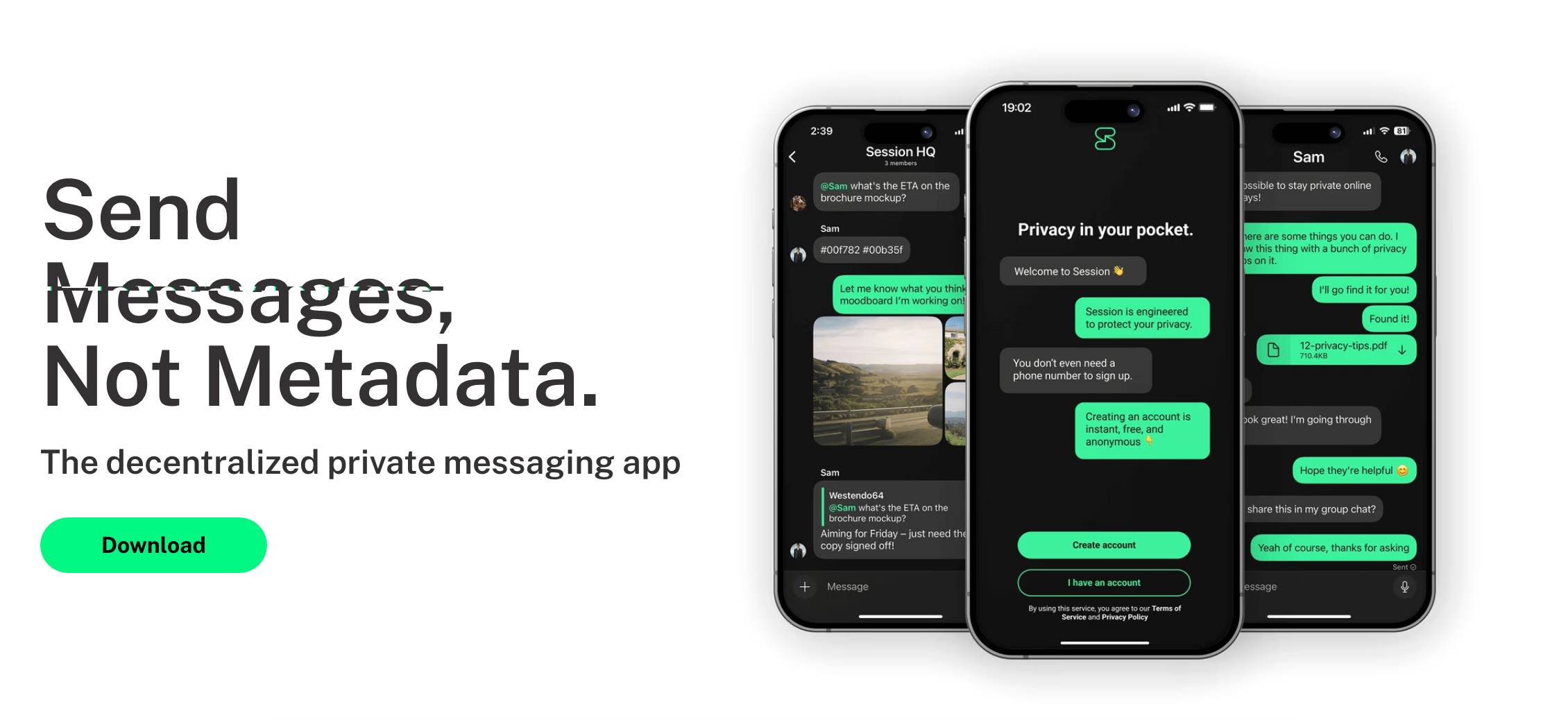
注册时,Session 会生成一个 66 位的随机字符串作为你的 Session ID,同时给你一组助记词用于账户恢复。没有手机号绑定,没有邮箱验证,没有任何能关联到你真实身份的信息。
技术上,Session 采用了一套类似洋葱路由的架构来保证隐私。
你发出的每条消息会被三层加密,依次经过三个随机选取的节点传递,每个节点只能解密属于自己的那一层,看不到消息的完整路径。这意味着没有任何单一节点能同时知道消息的发送者和接收者。
这些节点不是 Session 官方运营的服务器,而是来自社区。目前全球有超过 1500 个 Session Node 分布在 50 多个国家,任何人都可以运行节点,前提是质押 25,000 SESH 代币。
2025 年 5 月,Session 完成了一次重要升级,从原来依赖的 Oxen 网络迁移到自己的 Session Network。新网络基于权益证明共识,节点运营者通过质押 SESH 参与网络维护并获得奖励。

实际体验上,Session 的界面和主流通讯应用差别不大,支持文字、语音消息、图片和文件传输,也支持最多 100 人的加密群聊。语音和视频通话目前还在测试阶段。
一个明显的槽点是通知延迟,由于消息要经过多跳路由,有时候消息到达会比中心化应用慢几秒甚至更久。多设备同步也不够顺滑,这是去中心化架构的通病。
SimpleX,甚至连 ID 都不要的极端隐私
如果说 Session 的卖点是「不需要手机号」,SimpleX 则更激进:
它连用户 ID 都没有。
市面上几乎所有通讯应用,无论多强调隐私,都会给用户分配某种标识符。Telegram 用手机号,Signal 用手机号,Session 用随机生成的 Session ID。
这些标识符即使不关联真实身份,也会留下痕迹:如果你用同一个账号和两个人聊天,这两个人理论上可以确认他们在和同一个人通讯。
SimpleX 的做法是彻底取消这个标识符。每次你和一个新联系人建立连接,系统会生成一对一次性的消息队列地址。你和 A 聊天用的地址,与你和 B 聊天用的地址完全不同,没有任何共同的元数据。
就算有人同时监控这两条对话,也无法证明它们来自同一个人。
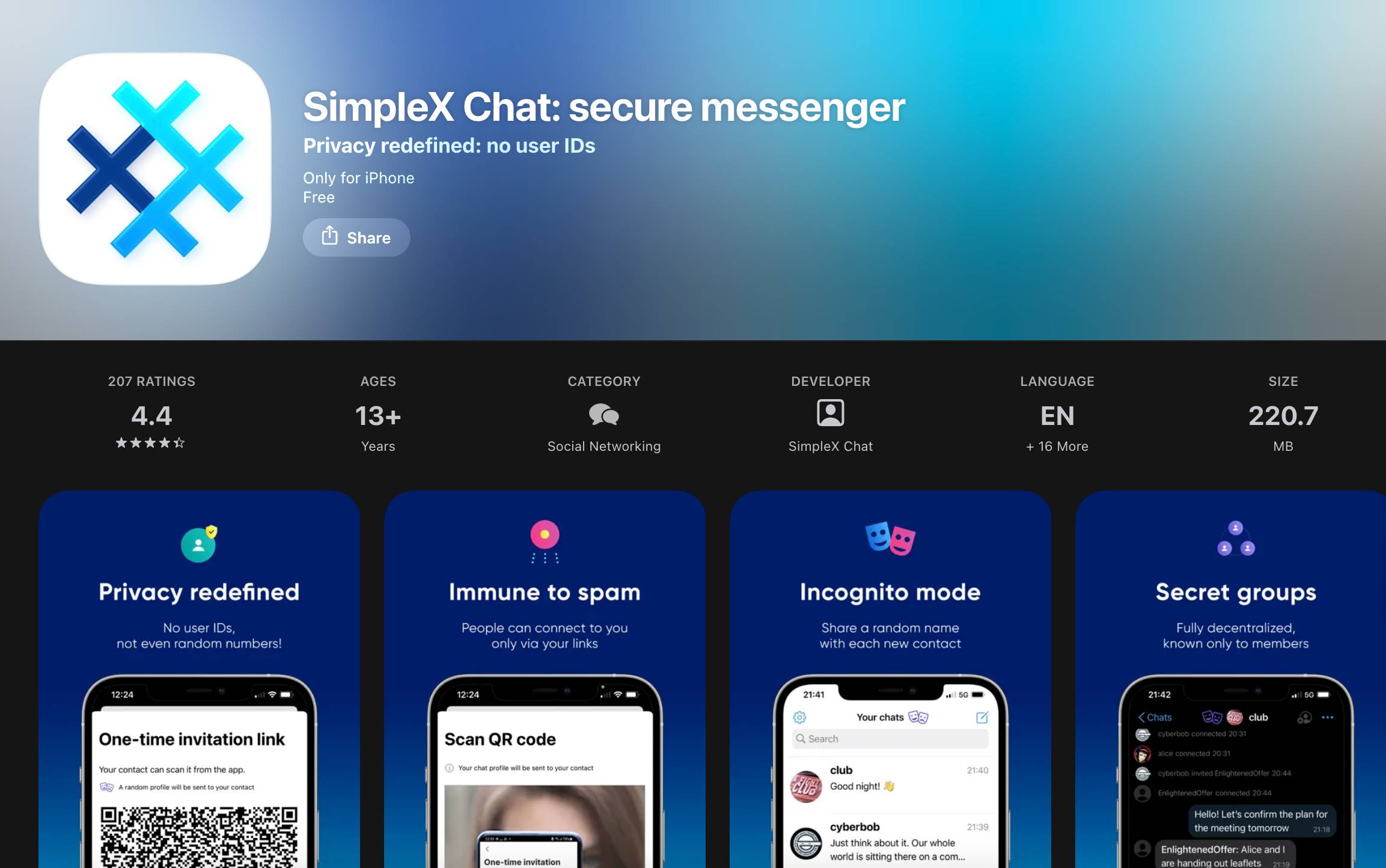
就算有人同时监控这两条对话,也无法证明它们来自同一个人。
注册 SimpleX 的体验也因此与众不同。打开应用后,你只需要输入一个显示名称,不需要手机号,不需要邮箱,甚至不需要创建密码。这个档案完全存储在你的本地设备上,SimpleX 的服务器上没有任何你的账户信息。
添加联系人的方式也不一样。你需要生成一个一次性邀请链接或二维码,发给对方,对方点击后才能建立连接。没有「搜索用户名加好友」这种功能,因为根本就没有用户名可搜。
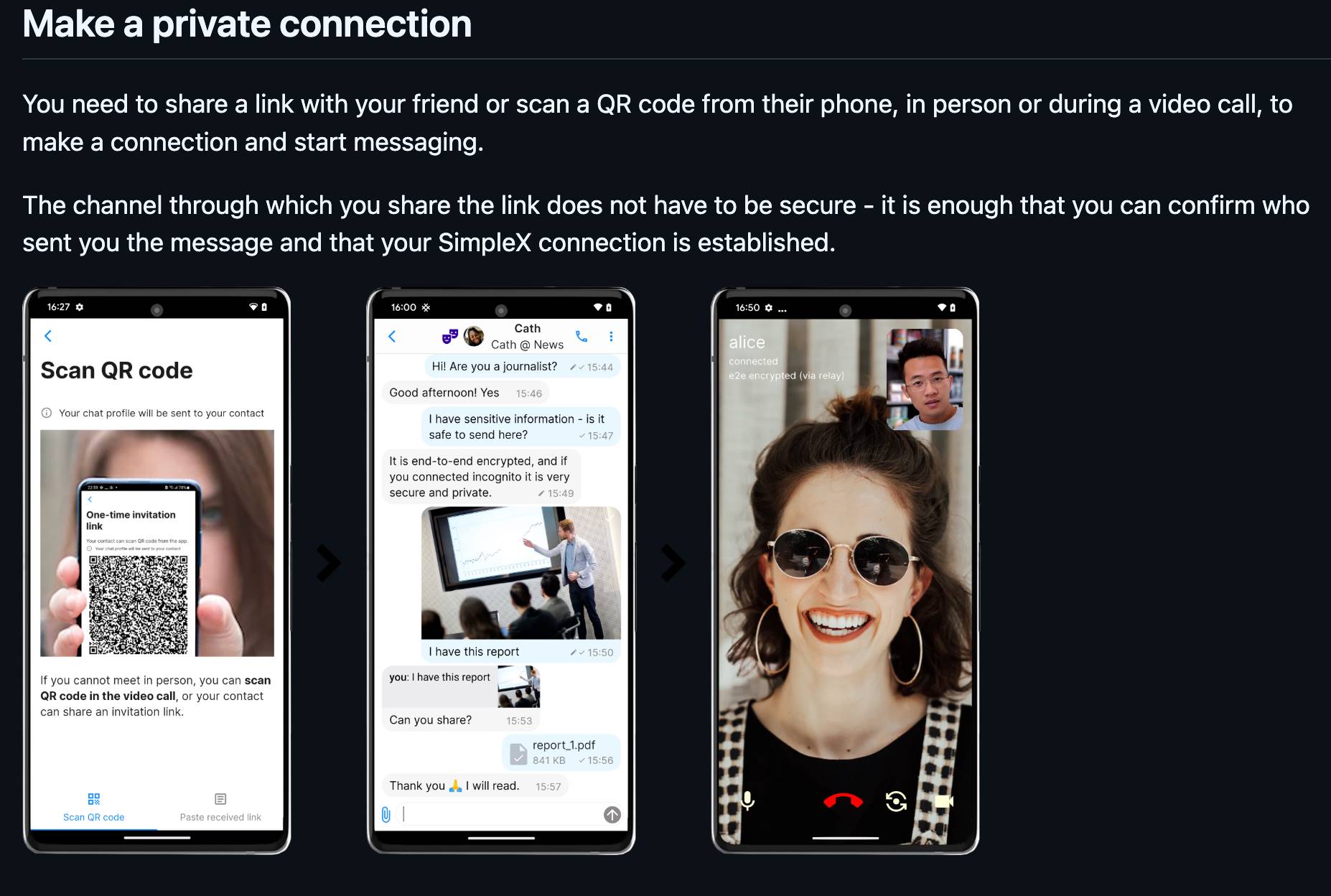
技术架构上,SimpleX 使用自己开发的 SimpleX Messaging Protocol。消息通过中继服务器传递,但这些服务器只是临时存储加密消息,不保存任何用户记录,彼此之间也不通信。消息送达后就会删除。服务器看不到你是谁,也看不到你在和谁聊天。
这个设计很极致,完全在为隐私保护做考虑。
顺带一提,该应用在 Github 上已经开源,这里有更多信息。
SimpleX 由 Evgeny Poberezkin 于 2021 年在伦敦创立。2022 年获得了 Village Global 领投的种子前轮融资,Jack Dorsey 曾公开表示对这个项目的认可。目前应用完全开源,通过了 Trail of Bits 的安全审计。
实际体验上,SimpleX 的界面比较简洁,支持文字、语音消息、图片、文件和阅后即焚消息。群聊功能也有,但因为没有中心化的成员列表管理,大型群组的体验不如传统应用。语音通话可用,视频通话还存在一些稳定性问题。
一个值得注意的限制是:由于没有统一的用户 ID,如果你换了设备或丢失了本地数据,你需要重新和每个联系人建立连接。没有「登录账号恢复所有聊天记录」这回事。
这也是极端隐私设计的代价。
2款应用商业模式对比:代币激励 vs 刻意去金融化
两个应用都在做隐私通讯,但商业模式的选择截然不同。
Session 走的是典型的 Web3 路线,用代币把网络参与者的利益绑在一起。SESH 是 Session Network 的原生代币,主要用途有三个:
-
运行节点需要质押 25,000 SESH 作为保证金;
-
节点运营者通过提供消息路由和存储服务获得 SESH 奖励;
-
未来还会有 Session Pro 会员和 Session Name Service 等付费功能用 SESH 结算。
这套模型的逻辑是:节点运营者有经济激励去维护网络稳定,质押机制提高了作恶成本,代币流通则为项目提供了可持续的资金来源。目前 SESH 的流通量约 7900 万,最大供应量 2.4 亿,有超过 6200 万 SESH 锁在 Staking Reward Pool 里作为节点奖励储备。
Vitalik 捐赠后,SESH 在几个小时内从不到 0.04 美元涨到 0.20 美元以上,市值一度突破 1600 万美元。这种暴涨当然有蹭热点的成分,但也说明市场在给「隐私基础设施」这个叙事定价。
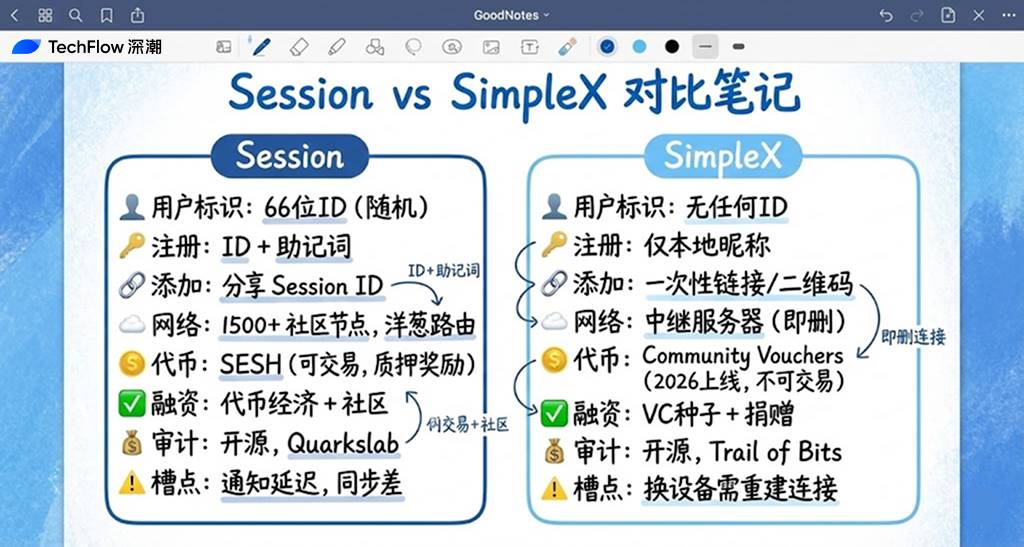
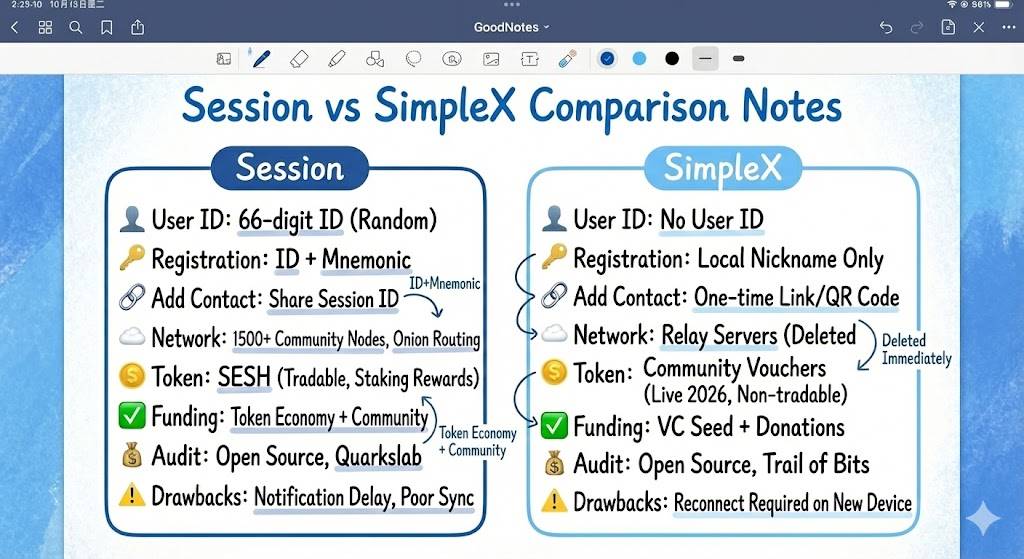
SimpleX 的选择完全相反。创始人 Evgeny Poberezkin 明确表示不会发行可交易的代币,因为他认为代币的投机属性会让项目偏离初衷。
SimpleX 目前的资金来源是 VC 融资和用户捐赠。2022 年的种子前轮融资约 37 万美元,用户捐赠累计超过 2.5 万美元。团队计划在 2026 年推出 Community Vouchers 来实现可持续运营。
Community Vouchers 是一种受限的实用型代币,可以理解为预付费的服务器使用券。用户购买 Vouchers 来支付自己所在社群的服务器费用,资金会分给服务器运营者和 SimpleX 网络。关键区别是:这些 Vouchers 不可交易,没有预挖,没有公开销售,购买时价格固定。
看起来,SimpleX 刻意把金融投机的可能性堵死了。
两种路线各有利弊。Session 的代币模型能快速吸引节点运营者和资本关注,但也让项目暴露在币价波动和监管风险中。SimpleX 的去金融化设计保持了项目的纯粹性,但资金来源有限,扩张速度会更慢。
这不只是商业策略的分歧,也反映了对「隐私应该如何被资助」的不同理解。
隐私通讯的共同难题
Vitalik 在捐赠推文里没有只说好话。他明确指出:
这两个应用都不完美,要实现真正的用户体验和安全性,还有很长的路要走。他提到的几个难题,其实是整个隐私通讯赛道的结构性问题。
第一个是去中心化本身的代价。中心化应用的消息传递快、稳定、体验顺滑,因为所有数据都经过同一套服务器,优化空间大。一旦走向去中心化,消息要在多个独立节点之间跳转,延迟就不可避免。
第二个是多设备同步。用 Telegram 或 WhatsApp,换一台手机登录账号,聊天记录就回来了。但在去中心化架构下,没有中央服务器存储你的数据,多设备同步要靠端对端的密钥同步机制,技术实现复杂得多。
第三个是 Sybil 攻击和 DoS 防护。中心化平台用手机号注册,天然就有一道门槛来过滤垃圾账号和恶意攻击。如果取消手机号绑定,怎么防止有人批量创建假账号来骚扰用户或攻击网络?
想要去中心化,就要牺牲一些体验;想要无许可注册,就要找别的方式防滥用;想要多设备同步,就要在隐私和便利之间做取舍。
Vitalik 选择在这个时候给这两个项目打钱,某种程度上也是在表态:这些问题值得被解决,而解决它们需要资金和关注。
对普通用户来说,现在就切换到 Session 或 SimpleX 可能还为时过早,体验上的短板确实存在。但如果你在乎自己的数字隐私,至少值得下载来试试,了解一下「真正的隐私」可以做到什么程度。
毕竟,当 Vitalik 愿意为一件事掏出真金白银的时候,这件事大概率不只是极客的自嗨。
免责声明:本文章仅代表作者个人观点,不代表本平台的立场和观点。本文章仅供信息分享,不构成对任何人的任何投资建议。用户与作者之间的任何争议,与本平台无关。如网页中刊载的文章或图片涉及侵权,请提供相关的权利证明和身份证明发送邮件到support@aicoin.com,本平台相关工作人员将会进行核查。




